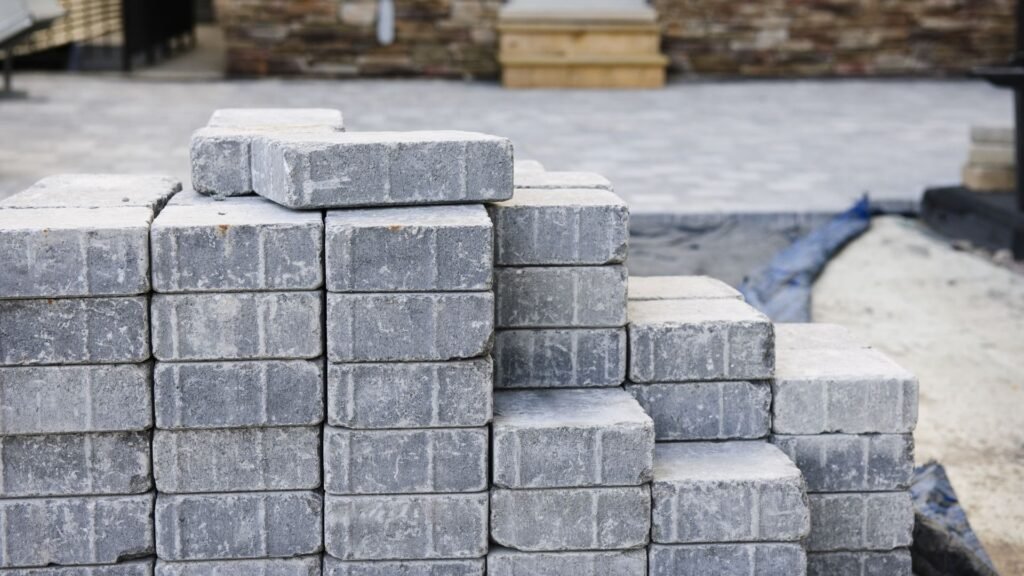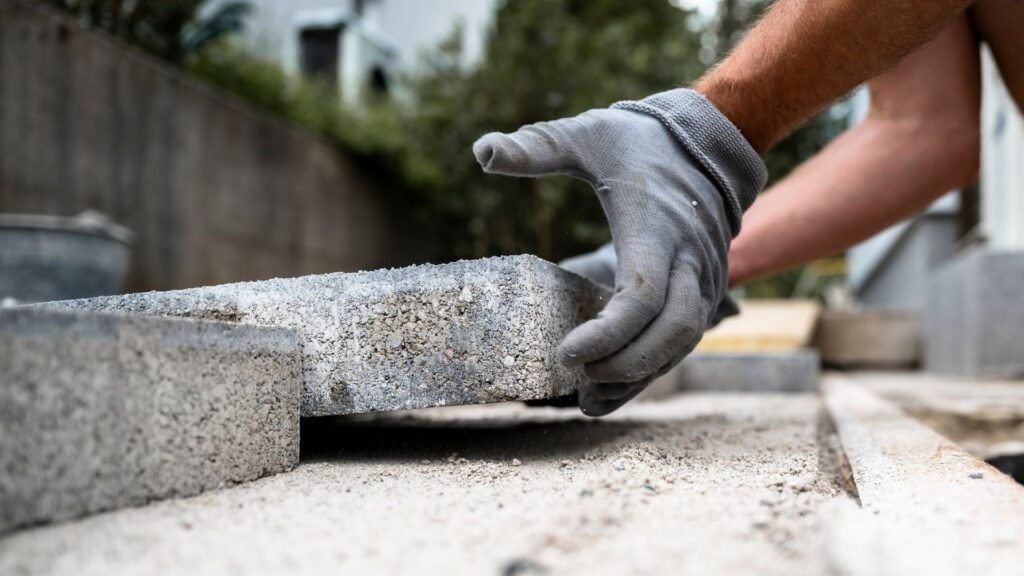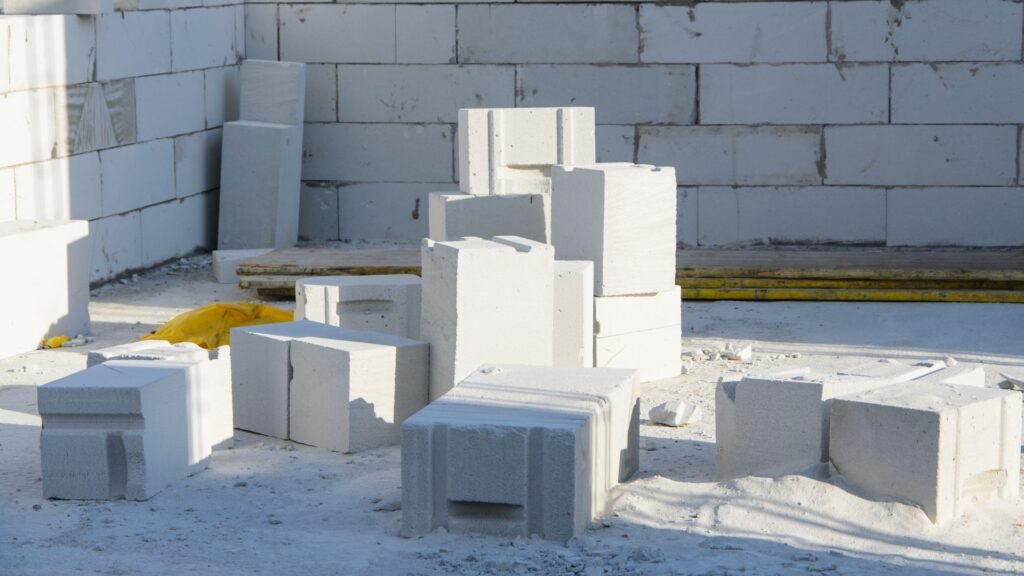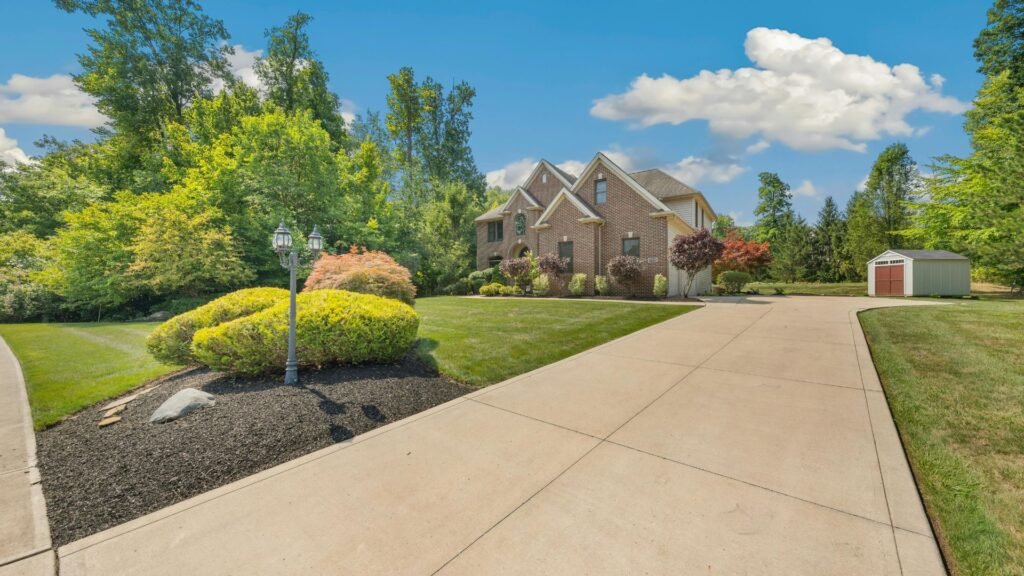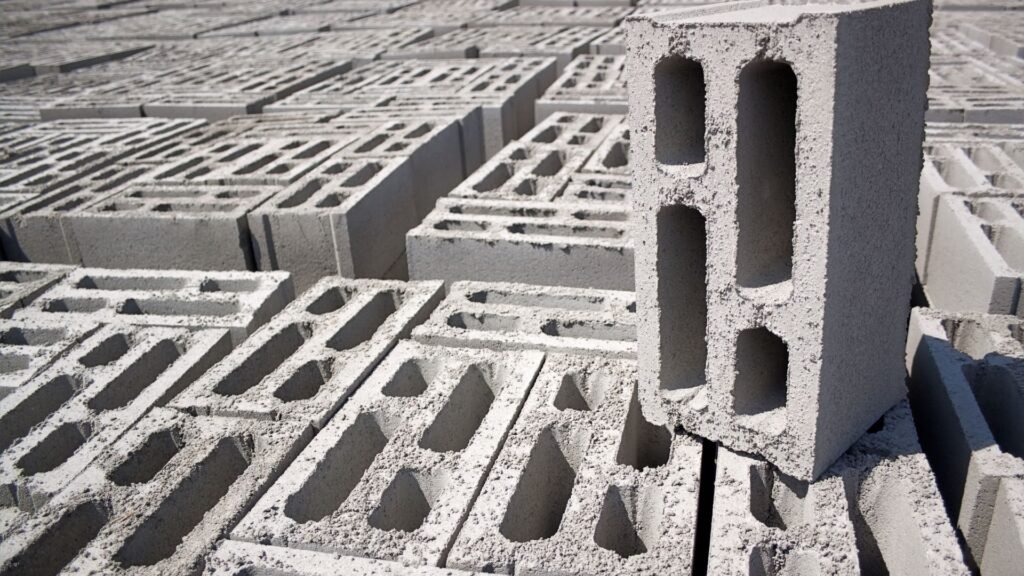Welcome to your go-to guide for paving stones in NZ, whether you’re revamping a patio, laying a garden path, or upgrading your driveway, choosing the right pavers can make a big difference. With so many styles, materials, and price points available, it’s easy to feel overwhelmed. This guide breaks it all down in plain English, helping you understand what works best for your space, your budget, and the local climate. You’ll learn the pros and cons of popular options, how much you might spend, design ideas, care tips, and where to buy in New Zealand, so you can make confident choices and create an outdoor area you’ll actually enjoy.
The best paving stones in NZ include concrete pavers for affordability and strength, natural stone for a premium look, clay pavers for timeless appeal, and porcelain for modern, low-maintenance finishes. Each type suits different outdoor spaces, climates, and budgets.
Table of Contents
Why Paving Stones Are Popular In NZ
Paving stones have become a top choice for outdoor landscaping across New Zealand, and it’s easy to see why. Homeowners value materials that can handle the local climate, enhance property appeal, and require little maintenance. Whether you live in a busy city, a quiet suburb, or near the coast, paving stones offer both function and visual appeal.
One of the biggest reasons paving stones are so widely used is their climate durability. New Zealand’s weather can be unpredictable, heavy rain, frost in winter, and strong UV exposure in summer are all common. Unlike plain concrete or gravel, quality paving stones are built to handle these conditions without cracking, fading, or shifting. This makes them a smart, long-term investment for outdoor spaces.
Another key reason is how versatile they are when it comes to home design. Whether your home is modern with sharp lines, a classic villa with traditional charm, or a relaxed coastal retreat, there’s a paving stone that fits. You can choose from various colours, textures, and patterns to match or contrast with your home’s exterior. This flexibility makes them ideal for everything from bold design statements to subtle enhancements.
Maintenance is also a big win. Paving stones are easy to look after year-round, with minimal effort. A quick sweep, occasional wash, and sealing when needed are usually enough to keep them looking good. They don’t attract moss as easily as some surfaces, and you can replace individual stones if any get damaged, no need to tear up the whole area.
When it comes to common use cases, paving stones shine in every corner of your outdoor area. They’re perfect for patios where you relax or entertain, garden paths that create flow and structure, driveways that stand up to daily vehicle use, and pool surrounds where grip and drainage matter. Their slip resistance and durability make them a practical choice across all these areas.
In short, paving stones are popular in NZ because they’re tough, stylish, low maintenance, and highly adaptable. They check all the boxes for creating outdoor spaces that look great and work well, no matter the season or location.

Types Of Paving Stones Available In NZ
Choosing the right paving stone is more than just picking what looks good. Each type serves a purpose, performs differently under NZ’s climate, and suits specific spaces better than others. Here’s a breakdown of the most popular types of paving stones available in New Zealand, so you can match the right one to your project.
Concrete Pavers
Concrete pavers are the go-to option for many Kiwi homeowners, and for good reason. They’re one of the most affordable choices on the market, making them perfect for large-scale projects like driveways, walkways, and patios. You’ll find them in a wide range of styles, colors, and textures, from smooth finishes to those that mimic natural stone. This versatility means you can match them to almost any outdoor design, whether you’re going for modern or classic.
Beyond looks, concrete pavers offer strength and ease of installation. Most suppliers in NZ stock concrete pavers in standard sizes, so replacing damaged ones later is simple. If you’re working within a budget but still want a clean, polished outdoor surface, concrete is a practical and reliable option.
Natural Stone Pavers
For a more refined, premium appearance, natural stone pavers stand out. Popular choices in NZ include granite, bluestone, and schist, each bringing a unique texture and color variation that synthetic materials can’t match. These stones naturally resist harsh weather and wear over time, making them long-lasting and ideal for areas where you want a durable surface with visual impact.
Natural stone suits patios, garden paths, poolside areas, and feature zones where you want to create a statement. While the upfront cost is higher, the strength and timeless appeal of real stone make it a strong long-term investment. It’s often chosen by homeowners who want their outdoor spaces to feel connected with the local environment and landscape.
Clay Pavers
If you’re after a traditional look that never goes out of style, clay pavers might be your best bet. Made from natural clay and kiln-fired, they’ve been used for centuries in both residential and public spaces. Their earthy tones and rich textures give paths and courtyards a warm, rustic feel.
Clay pavers are also known for their resistance to fading, which is important under New Zealand’s strong sunlight. Unlike concrete, their color runs through the entire paver, so it doesn’t wear away over time. They’re especially popular in heritage homes or garden paths where character matters just as much as performance.
Porcelain Pavers
Porcelain pavers are the modern solution for stylish, low-maintenance outdoor areas. Manufactured from refined clay and fired at high temperatures, they’re dense, durable, and water-resistant. The sleek, modern finish of porcelain makes it ideal for contemporary designs, especially around pools and alfresco areas.
Because they’re non-porous and stain-resistant, porcelain pavers require little upkeep. You won’t need to worry about sealing or regular deep cleaning. Their slip-resistant surfaces also make them a smart option for pool surrounds, outdoor kitchens, and patios where safety matters.
Porcelain pavers are slightly more expensive than concrete but offer a refined look that stays clean and sharp for years with minimal effort.
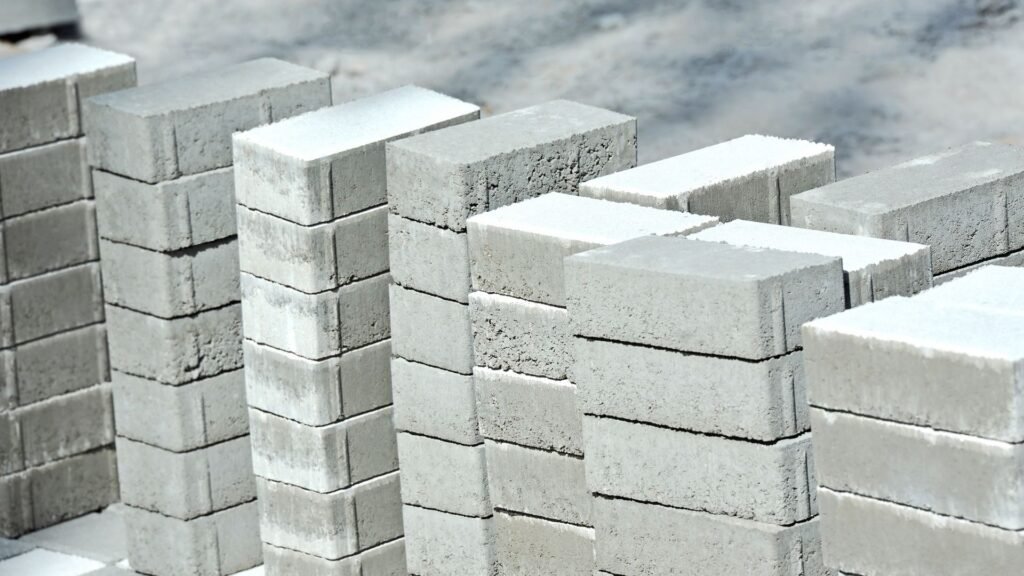
How To Choose The Right Paving Stone
Choosing the right paving stone for your outdoor space isn’t just about picking what looks good. It’s about function, style, safety, and how much time and money you’re willing to put into maintenance. Whether you’re redoing a patio, a walkway, or a driveway, the right decision will improve the look and performance of your space for years.
- Match The Paver To Your Home’s Style
Start by looking at the style of your home. Is it modern, traditional, coastal, or rustic? Your paving stones should complement that overall look. For modern homes, smooth porcelain or large-format concrete pavers often work best. If your house leans traditional or has a cottage feel, clay bricks or tumbled natural stone might suit it more. Try to create a visual flow between indoor and outdoor spaces so nothing feels out of place. Matching colours and textures can help tie everything together. - Consider Sun Exposure, Moisture, And Foot Traffic
Not all areas of your yard will have the same needs. High-sun zones can fade some materials over time, so look for UV-resistant options like natural stone or porcelain. Damp areas, like garden paths or shaded patios, need pavers that handle moisture well. In these cases, non-porous options help reduce the risk of moss and algae buildup. For high-traffic spots like driveways or front entrances, you’ll want strong, load-bearing pavers that won’t shift or crack easily. Always think about how the space will be used before you choose a style. - Slip Resistance And Safety
Safety should be a top priority, especially in wet climates like many parts of New Zealand. Smooth or glossy pavers might look great, but they can become slippery when it rains. For pool surrounds or paths near gardens, choose textured surfaces with natural grip. Many concrete and stone pavers are available in non-slip finishes. Also, think about how your paving will perform when wet, some materials absorb water and become hazardous. A safe surface makes all the difference for both adults and children. - Budget And Maintenance Level
Paving stones come in a wide price range, but don’t just go for the cheapest option. Think long-term. Concrete is usually the most budget-friendly and easy to install. Natural stone costs more but can last decades with minimal wear. Porcelain has a higher upfront cost but rarely needs sealing or heavy maintenance. Some pavers need yearly sealing, while others just need the occasional clean. If you want a low-maintenance solution, choose materials that resist stains, moss, and fading. Always weigh upfront cost with long-term effort.
Choosing the right paving stone is about balance, style, function, and durability. Take the time to plan, and you’ll end up with a space that’s both beautiful and built to last.
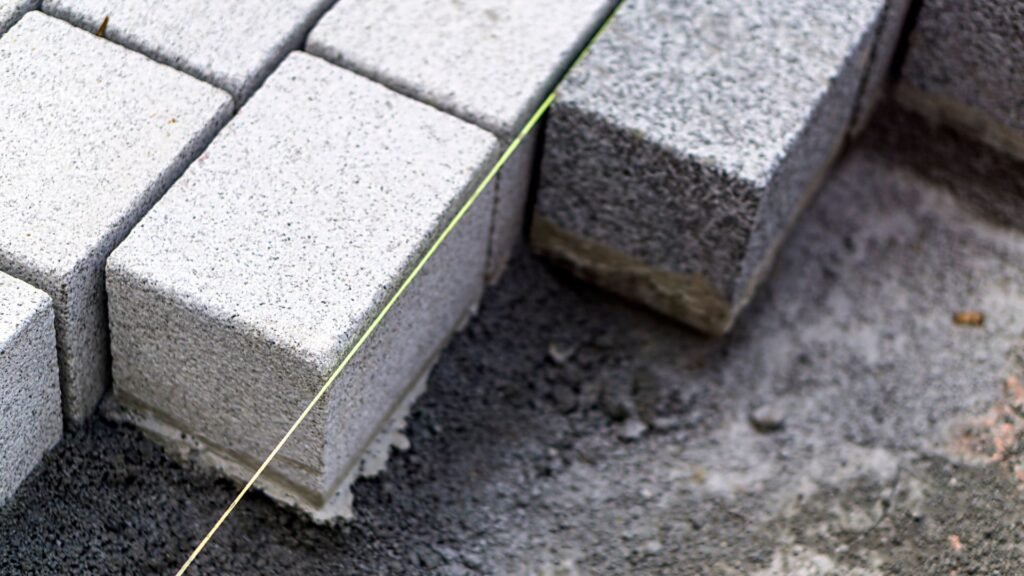
Cost Of Paving Stones In NZ
If you’re planning to upgrade your outdoor area, it’s smart to understand the cost of paving stones in NZ before you start buying materials or hiring a contractor. The total cost depends on the type of paver you choose, how much surface area you need to cover, and whether you’re doing the job yourself or working with a professional. Here’s a breakdown of average paving stone prices per square metre and what can drive the final cost up or down.
Average Cost Per m² By Type
- Concrete Pavers: $30–$70 per m²
Concrete pavers are the most affordable and widely used option in New Zealand. They come in different sizes, shapes, and colours, which makes them flexible for various outdoor designs. Their popularity also means there’s a wide pricing range depending on quality, texture, and finish. The lower end of the range usually covers standard grey pavers, while the upper end includes more decorative or textured finishes. - Natural Stone Pavers: $90–$150 per m²
Natural stone like bluestone, granite, or schist gives a premium, timeless look. These stones are quarried and cut for durability and visual appeal. Because they’re heavy, harder to produce, and imported in some cases, they sit at the higher end of the price range. But many Kiwi homeowners choose them for their long-lasting appeal and natural charm. - Clay Pavers: $50–$90 per m²
Clay pavers are made from baked natural clay and have a traditional look. They’re durable, colourfast, and eco-friendly. Their slightly higher price compared to concrete is justified by their lifespan and natural beauty. They’re a great choice for walkways, patios, and heritage-style homes. - Porcelain Pavers: $80–$130 per m²
Porcelain is a newer option that’s becoming popular for its modern look and low maintenance. These pavers are dense, stain-resistant, and ideal for wet areas like pool surrounds. Although they cost more upfront, they often require less maintenance over time and hold up well in NZ’s changing climate.
Factors That Affect Price
Several factors can influence the final cost of your paving project, beyond just the cost per square metre.
- Quantity Needed
The larger the area, the more material you’ll need. Buying in bulk may get you a small discount from some suppliers, but overall cost increases with size. Be sure to include a bit of extra material to allow for cuts, breaks, and future repairs. - Delivery Costs
Delivery can add a significant amount, especially if you’re ordering heavy materials like natural stone or porcelain. Rates vary based on distance, access to your site, and the size of the order. Local suppliers may offer better rates or free delivery within certain zones. - Installation Costs
If you’re hiring a professional, labour usually adds $40–$100 per m² depending on the complexity of the job. Ground preparation, drainage, edging, and design details like curves or patterns can raise the labour cost. DIY can save you money, but it requires tools, time, and proper prep to avoid costly mistakes.
Understanding these pricing factors helps you plan better and avoid unexpected expenses. Whether you’re paving a small path or a full driveway, knowing what to expect allows you to match your budget with your design goals.
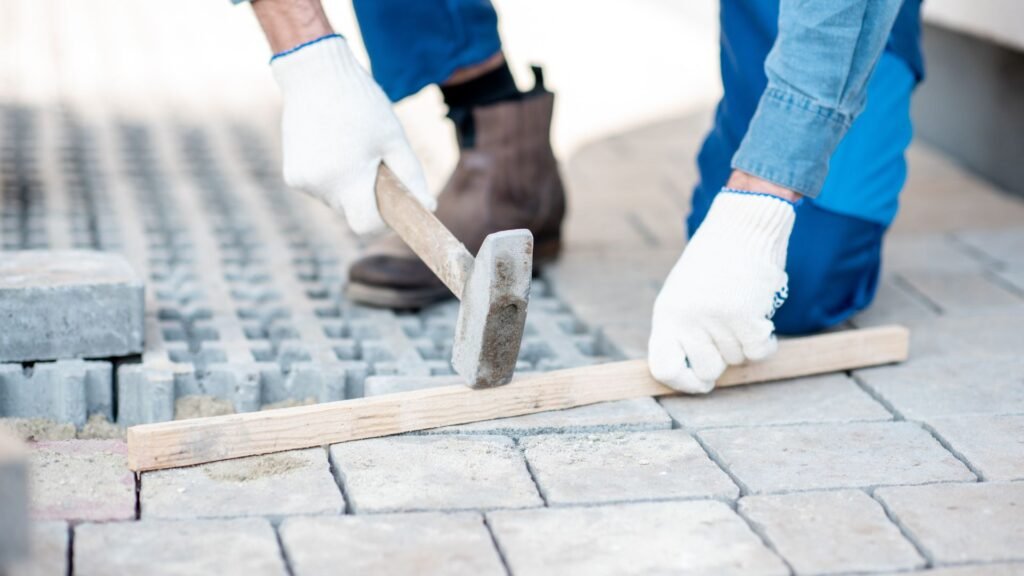
DIY vs. Professional Installation
When planning to install paving stones in NZ, one of the biggest decisions you’ll face is whether to take the DIY route or hire a professional. Both options have pros and cons, and the right choice depends on the size of your project, your budget, and how confident you are with hands-on work. This section breaks down when it makes sense to go DIY and when you’re better off bringing in an expert.
DIY
When It’s Worth Doing It Yourself (Small Projects)
DIY paving is a good choice for smaller areas like garden paths, small patios, or simple stepping stone layouts. If your project is flat, doesn’t require cutting many pavers, and involves minimal drainage work, it’s manageable with some patience and basic tools. It’s also ideal if you enjoy doing hands-on home improvements and want to save on labor costs.
Tools And Skills You’ll Need
To install paving stones yourself, you’ll need the following tools:
- Shovel and wheelbarrow for digging and moving materials
- Spirit level and string line to keep everything straight
- Plate compactor to compact the base
- Rubber mallet to set pavers without damage
- Brick saw or angle grinder (if cutting pavers)
- Screed rails and a screeding board to level the bedding layer
You’ll also need basic skills like measuring accurately, leveling the ground, and laying pavers with consistent spacing. Watching local tutorials or asking a supplier for tips can help avoid common mistakes.
Time Investment And Prep Work
DIY paving takes time, often more than you expect. For a small patio, you might spend a full weekend on excavation, base prep, laying, and clean-up. Prep work is the most important step: you need a solid, compacted base (usually GAP 40 or GAP 20) and a level bedding layer (sand or crusher dust). Rushing the prep can lead to uneven surfaces or drainage issues later on. If you’re up for the challenge and have time to spare, DIY can be a rewarding and budget-friendly option.
Hiring A Professional
- When It’s Worth Paying For An Expert
For larger, more complex projects, like driveways, multi-level patios, or areas with poor drainage, professional installation is the smarter choice. Contractors have the experience and equipment to ensure proper grading, base preparation, and long-term durability. If you’re working with premium materials like natural stone or porcelain, hiring a professional reduces the risk of damage or misalignment during installation. - What To Look For In A Paving Contractor
Look for a contractor with solid experience in paving projects similar to yours. They should be able to show you past work, offer references, and provide a clear project timeline. A good contractor will also understand NZ’s local conditions and soil types, which can affect how your base should be prepared.
Check that they are licensed (if required in your area), insured, and use quality materials. Ask if they handle everything from site prep to cleanup and if their quote includes the full scope of work.
Questions To Ask Before Hiring
- How many years have you been installing paving stones?
- Can you show photos or examples of recent projects?
- What’s included in your quote? Are there any hidden costs?
- How do you prepare the base and ensure proper drainage?
- Do you offer any workmanship warranty or guarantee?
- How long will the project take from start to finish?
Choosing between DIY and hiring a pro comes down to your project scale, available time, and confidence in your skills. For a quick weekend job, DIY is fine. For a clean, durable finish that lasts years with minimal maintenance, hiring a qualified professional often pays off in the long run.
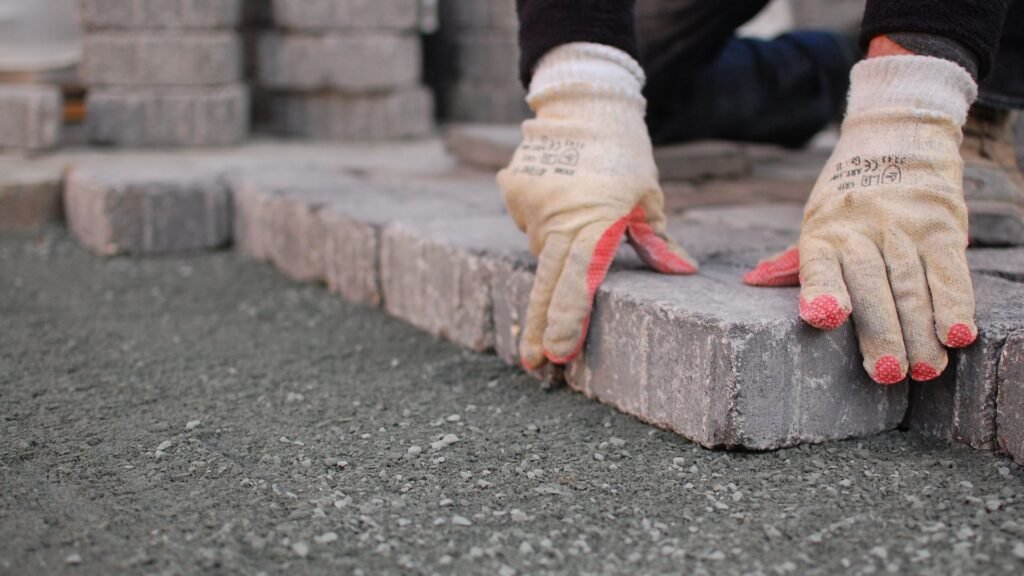
Paving Stone Design Ideas For NZ Homes
When planning your outdoor space, the design of your paving stones can make or break the overall look. Beyond choosing the right material, the way you lay the pavers, along with the patterns, edges, and materials you mix in, can help turn a simple backyard or front entry into a standout feature. Here’s how homeowners across New Zealand are using paving stones to create outdoor spaces that feel both functional and stylish.
- Pattern Ideas: Herringbone, Basket Weave, Stacked Bond
The pattern you choose affects both the visual appeal and the durability of your paved area. For high-traffic zones like driveways or walkways, herringbone is a smart choice. It’s laid at a 45- or 90-degree angle and interlocks tightly, helping prevent pavers from shifting over time. Basket weave offers a more traditional look with a timeless, decorative layout that works well in courtyards and patios. A stacked bond is a simple, modern pattern where pavers are aligned in straight rows and columns, perfect for minimalist gardens or new builds. It’s easy to lay but best suited for areas with light foot traffic. - Mixing Materials (e.g. Pavers With Grass Or Gravel)
Combining pavers with other natural elements adds contrast and texture to your design. One popular method in NZ is to space pavers evenly and fill the gaps with artificial turf or natural grass. This softens the look and allows for water drainage, making it both practical and visually appealing. Another trend is using gravel between large-format pavers. This approach breaks up solid surfaces, making your space feel more open and less rigid. It’s a smart option for pathways, courtyards, or areas around raised garden beds. - Bordering And Edging Tips
Borders help define your paved space and keep the layout neat. For example, using darker or contrasting pavers as a border can create a frame effect that draws the eye in. If you’re using natural stone, consider a tumbled edge to blend seamlessly with the surrounding garden. For more structure, concrete edging keeps everything in place and prevents spreading or shifting over time. Edging also matters when working with gravel or grass, it creates a clean finish and makes maintenance easier. - Real NZ Examples (Suggest Adding Local Inspiration Or Gallery)
Across New Zealand, homeowners are getting creative with their paving projects. In suburban Auckland, you’ll find homes using light-colored porcelain pavers paired with black edging for a sleek, modern patio. Down in Christchurch, it’s common to see rustic clay pavers laid in a herringbone pattern around brick homes. Coastal properties in the Bay of Plenty often use natural stone combined with native plants and pebbles to match the relaxed, outdoor lifestyle. If you’re unsure where to start, browse local supplier galleries or home improvement stores in NZ to see real-world examples that reflect our climate, soil types, and design trends.
By combining pattern, texture, and layout, you can turn your paving stones into a visual feature that elevates your entire outdoor space. Whether you want something bold and modern or simple and timeless, there’s a design approach that will work for your NZ home.
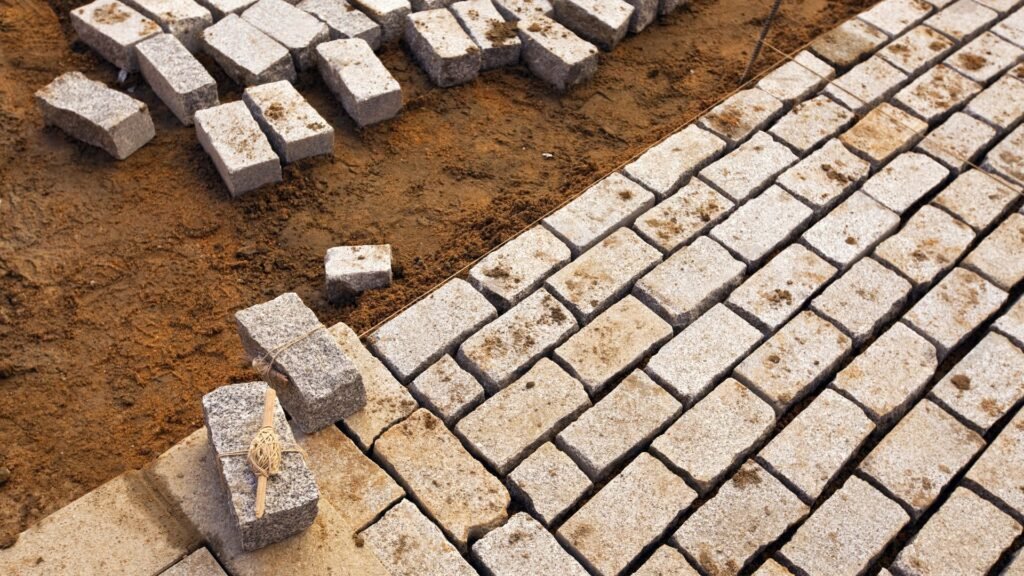
Caring For Your Paving Stones
Keeping your paving stones in great condition isn’t hard, but it does require regular attention. Whether you’ve chosen concrete, natural stone, clay, or porcelain pavers, proper care will extend their life, preserve their appearance, and help you avoid costly repairs down the road. Here’s a breakdown of how to clean them based on material, prevent common issues like moss and weeds, know when sealing is worth it, and stay on top of seasonal maintenance.
Cleaning Tips By Material
Not all paving stones are created equal, so your cleaning approach should match the material you’ve used.
- Concrete pavers: Use a garden hose or pressure washer on a low setting with a mix of warm water and mild detergent. Avoid using acidic cleaners, as they can wear down the surface.
- Natural stone (like granite or bluestone): Use pH-neutral cleaners only. Acidic products can damage the surface or leave permanent marks. A soft-bristle brush works best for scrubbing.
- Clay pavers: Clay is quite durable but can show stains more easily. Clean with warm, soapy water and a stiff broom. Avoid harsh chemicals.
- Porcelain pavers: These are non-porous and easy to clean. A simple mop or spray with water usually does the trick. Avoid using wax-based cleaners, which can leave residue.
Always sweep off debris like leaves or dirt regularly to prevent buildup and staining.
How To Prevent Moss And Weeds
Moss and weeds are common issues for outdoor pavers, especially in shady or damp areas. Here’s how to deal with them:
- Good drainage: Make sure water doesn’t pool on your paving. Standing moisture encourages moss and algae to grow.
- Regular sweeping: Removing organic debris like leaves and dirt helps prevent moss spores and weed seeds from settling in the joints.
- Jointing sand: Replacing the sand between your pavers every year helps block weed growth. Consider using polymeric sand, which hardens and stays in place better.
- Weed killer: For stubborn weeds, use a natural vinegar solution or a safe, non-toxic weed spray. Apply it early before they take root.
- Moss control: In shaded areas, moss is hard to avoid. Scrub it off with a stiff brush and water, or apply moss-killing treatments designed for pavers.
Sealing Advice (When And Why To Seal)
Sealing your paving stones can protect their surface and make cleaning easier, but it’s not always necessary. Here’s when it makes sense:
- When to seal: Wait at least 6–12 months after installation to allow natural efflorescence (salt deposits) to appear and be cleaned off. Seal once the pavers are clean and dry.
- Why seal: Sealing helps repel water, stains, and oil. It also reduces fading from sun exposure. For natural stone and concrete, sealing can enhance the color and prevent moss growth.
- How often: Reapply every 2–3 years, depending on traffic and weather exposure. Always follow the product’s directions for best results.
Porcelain pavers usually don’t require sealing, but a non-slip coating can be added for safety in wet areas like pools.
Seasonal Maintenance Checklist
Taking time each season to care for your paving stones will keep them looking their best all year long. Here’s a quick seasonal guide:
- Spring: Remove any leftover winter debris, scrub off moss, check for shifting or cracked pavers, and refresh jointing sand if needed.
- Summer: Power wash the surface gently, trim nearby plants to prevent shading and moisture buildup, and reseal if it’s due.
- Autumn: Sweep fallen leaves often to prevent staining, clean off algae or dirt, and inspect drainage to prepare for heavy rain.
- Winter: Avoid using salt or de-icing chemicals, which can damage the surface. Use a plastic shovel to remove snow and watch for slippery spots.
With the right care routine, your paving stones will stay strong, safe, and great-looking for years to come, no need to stress over them every season. Just stay consistent and make small efforts that pay off big over time.
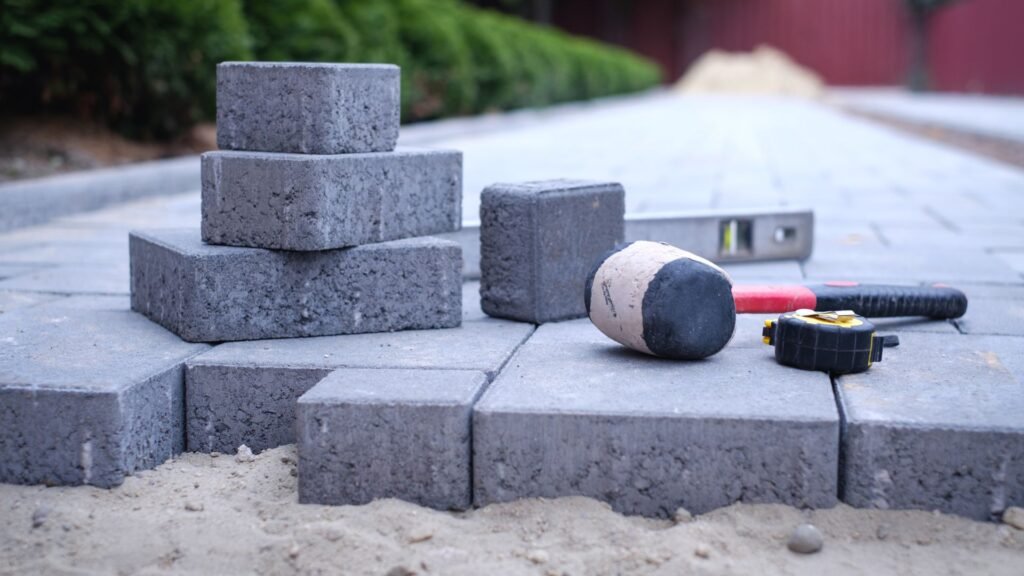
Where To Buy Paving Stones In NZ
When it comes to buying paving stones in NZ, it’s not just about finding a supplier, it’s about finding the right one. The quality of your outdoor space depends heavily on where your materials come from. Whether you’re laying a patio, driveway, or garden path, choosing a trusted supplier ensures the pavers you get are durable, weather-resistant, and suited for your project.
Top Local Suppliers And Brands In New Zealand
New Zealand has a number of well-known suppliers that offer a wide range of paving stones. These companies often stock concrete, natural stone, clay, and porcelain options in various finishes and sizes. A few reliable names include:
- Firth – One of the most recognized brands in NZ, known for its concrete pavers designed for local conditions.
- Premier Group – Offers premium paving products, including designer concrete and stone pavers.
- Urban Paving – Based in Christchurch, they offer concrete, natural stone, and permeable pavers.
- Stonex – Ideal for homeowners looking for high-end natural stone and tile products.
- Paving Slab Co – Specializes in large format pavers and customized solutions for homes and businesses.
Buying from reputable suppliers ensures you’re getting NZ-compliant materials, local support, and a selection that suits different tastes and budgets.
Things To Ask Before Buying
Before placing an order, ask a few key questions to make sure you’re making the right choice:
- What material is best suited for my space (concrete, stone, clay, or porcelain)?
- Are the pavers slip-resistant and weatherproof?
- Do they require sealing or regular maintenance?
- Is delivery included in the price, and how long does it take?
- Can I get samples to test color and texture at home?
- Are there bulk discounts available?
- Do you offer installation or can you recommend contractors?
Asking these questions helps you avoid buying the wrong type of paver, overspending, or ending up with a style that doesn’t suit your home.
Why Viewing Samples Matters
Online images rarely tell the full story. Paving stones often look different in person due to lighting, finish, or surface texture. That’s why viewing samples, either in a showroom or by ordering small test pieces, is essential. It gives you a better idea of how the material feels, how it looks next to your home’s exterior, and whether the finish matches what you had in mind.
Samples also allow you to compare colors in natural light, test slip resistance with wet feet, and see how easily the surface marks or stains. These small checks can prevent costly mistakes and help you feel more confident in your final choice.
If you’re serious about building a long-lasting outdoor space, take the time to visit a few local suppliers or request samples before making your final decision. The extra effort pays off in quality, comfort, and curb appeal.
Ready to upgrade your outdoor space? Explore quality paving stones and expert advice tailored for NZ homes. Visit us to get started.
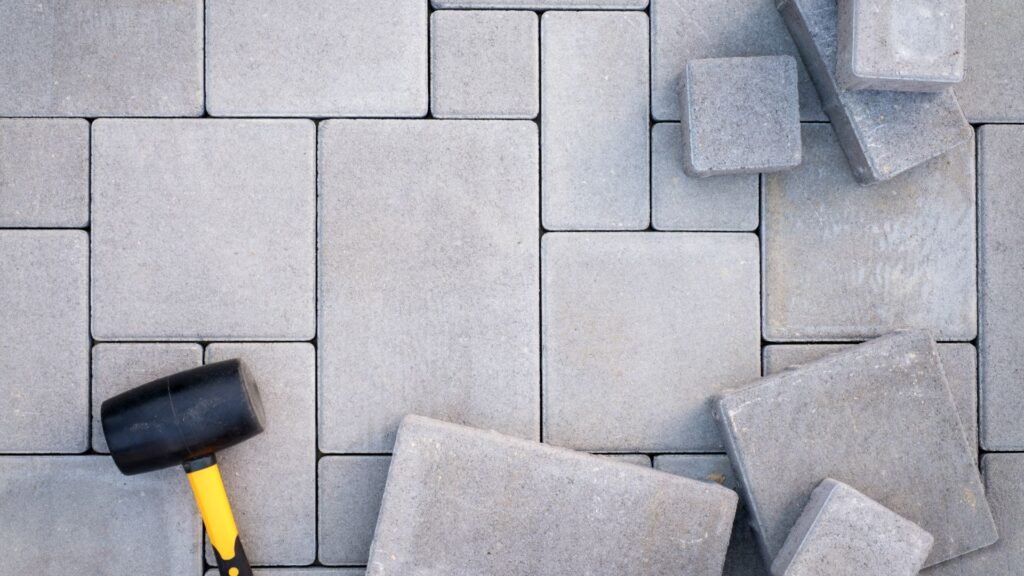
FAQs: About Best Paving Stones NZ
What are paving stones made of?
Paving stones are made from materials like concrete, natural stone (granite, bluestone, schist), clay, or porcelain. Each material offers different looks, textures, and levels of durability.
Which type of paving stone is best for driveways?
Concrete pavers are best for driveways due to their strength and cost-effectiveness. They can handle heavy vehicle loads and come in various shapes and finishes.
Are natural stone pavers worth the cost?
Yes, natural stone pavers are a premium option that adds long-term value. They’re highly durable, weather-resistant, and offer a timeless, high-end look.
How much do paving stones cost in NZ?
Costs vary by material. Concrete ranges from $30–$70 per m², natural stone from $90–$150, clay from $50–$90, and porcelain from $80–$130 per m², excluding installation.
Can I install paving stones myself?
Yes, DIY is possible for small areas like garden paths or patios. You’ll need proper base preparation, tools, and time. Larger or high-traffic areas are better handled by professionals.
Do all paving stones need sealing?
Not all. Natural stone and concrete pavers benefit from sealing to prevent stains and moss growth. Porcelain is non-porous and usually doesn’t need sealing.
What’s the best paving stone for pool areas?
Porcelain pavers are ideal for pool surrounds. They’re non-slip, non-porous, and resist stains. Natural stone with a textured finish is also a popular choice.
How do I maintain paving stones year-round?
Keep them clean with water and mild detergent. Remove weeds from joints and reapply jointing sand if needed. Sealing helps protect against moisture and stains.
Can paving stones handle NZ’s weather conditions?
Yes. Most pavers are built to handle NZ’s wet, frosty, and UV-heavy climate. Just ensure the material you choose has proper drainage and slip resistance.
Where can I buy paving stones in NZ?
You can buy from local landscape supply stores, garden centres, or specialist paving suppliers. It’s best to visit in person to see samples and get expert advice.
Conclusion
Choosing the right paving stones in NZ comes down to understanding your options, your budget, and how you want your outdoor space to feel and function. Concrete, natural stone, clay, and porcelain all offer unique benefits in terms of appearance, durability, and price. Whether you decide to go the DIY route or hire a professional, make sure your base preparation is solid and suited to NZ’s weather. Proper care, like cleaning, sealing, and seasonal upkeep, will keep your pavers looking fresh for years. Now’s the time to take the next step: plan your project, explore design ideas, grab some samples, and speak with a trusted supplier who knows the local market. Thinking of upgrading your outdoor space? Start with the right paving stones.

